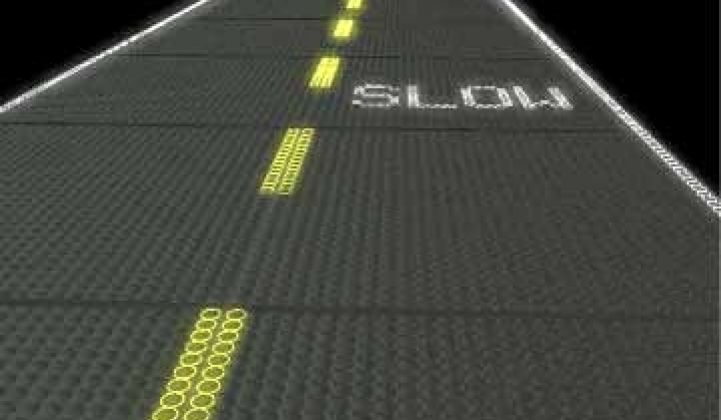The Ecomagination Challenge launched by GE last month already has more than 1,000 entrants, but it still looks to be a wide-open field that anyone could win by September 30.
Some of the most popular ideas range from conventional small-scale renewables, such as vertical wind turbines on skyscrapers to complete infrastructure overhauls, like solar roadways.
Currently, the projects that have been submitted from all over the world are subjected to a popularity contest with a $50,000 prize. But there is a lot more money at stake: $200 million in total. GE will hand the bulk of that money out to projects proposed by five lucky recipients, which a panel of judges will vote on this fall. The prizes will be based on "merit; reliance on science and engineering fundamentals; innovative character; potential to create significant societal impact; commercial feasibility in light of applicable market dynamics; and other factors deemed appropriate by the judges."
The five prizes will receive $100,000 each and be considered for an equity investment by GE, an agreement to develop a technology or consideration to be part of the GE Ecomagination program.
Of the ideas that have been submitted, about half fall under the category of renewables, while the rest of the entries are split between grid efficiency and efficient buildings.
The most popular project to date is lambasted by some other entrants because it doesn't come from an entrepreneur, but rather a company. Nextek Power Systems advocates using DC power connectors to link renewables to buildings. The idea certainly falls under the parameters of the Challenge, but others are calling for Nextek or Future House Canada, the current runner-up in popular votes, to forgo the $50,000 prize if they get it. (There is no response in the comments section that indicates that either company would do so.)
Solar Roadways, which involves covering current roadways, driveways and parking lots with solar panels, is also near the top. Actually, it is currently holding three of the top 10 spots, making me wonder who is overseeing this Challenge. The idea is just what it sounds like, putting solar panels over existing roads that could be used to charge EVs, homes and more.
Although cost will be one of the factors that the entries will be judged on, that doesn't seem to be a concern for many of the ideas. Terraspan man, who spends a lot of time commenting on other pages, is advocating a transcontinental superconducting power distribution system. But that's not all. It will be combined with Mag-Lev trains (forget about the fact that the U.S. doesn't even have a true high-speed steel-on-steel train yet, although California is certainly trying).
Many of these ideas are creative, if you could start from scratch and rebuild the entire power system and there was endless money available. But some are more grounded in reality, so real that they already exist, like using power-line communication to read gas and electric meters, a technology already used widely in Europe. On the consumption side, there are ideas for home energy management systems and software for an electric vehicle that can anticipate power needs based on driving habits.
While some entries are based on sound technology, it's tough to really know what to make of most of the ideas, since they are presented in just a few sentences and many do not include links to websites. I'm not exactly sure what to think of "a system that lessens the trash or energy wastage in the tourism industry."
So while the public voting system seems to be kind of a sham (most votes seem to be entrants voting for each other), the panel of GE business units, academics, venture capitalists and government scientists expects to pick some of the most promising, and cost-effective, ideas and bring them to market. GE will announce any business deals that stem from the contest in November 2010.



